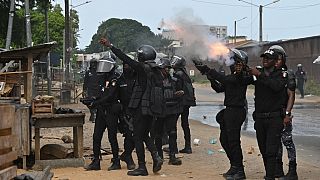Ivory Coast
Ivory Coast's government on Tuesday accused the opposition of "plotting" against the state after it vowed to set up a rival government following bruising presidential elections won in a landslide by the incumbent, Alassane Ouattara.
The standoff pitched the West African nation deeper into a three-month-old crisis that has claimed several dozen lives, triggering EU appeals for calm and dialogue.
Hours after 78-year-old Ouattara was declared victor with more than 94 percent of the vote, Justice Minister Sansan Kambile accused the opposition of "acts of assault and plotting against the authority of the state."
The Abidjan public prosecutor has been asked to investigate, Kambile said, warning that "all options are on the table."
Opposition leader Pascal Affi N'Guessan had told reporters late Monday that opposition parties and groups were forming a "council of national transition."
"This council's mission will be to... create a transitional government within the next few hours," N'Guessan said.
The goal, he said, was to "prepare the framework for a fair, transparent and inclusive presidential election."
Ouattara's landslide in Saturday's vote had been widely expected -- two opposition leaders had called for a boycott of the ballot and a civil disobedience campaign.
But the protests and bloody clashes have also stirred traumatic memories of a crisis a decade ago that tore the country apart and dealt it lasting economic damage.
Around 3,000 people died after then-president Laurent Gbagbo refused to accept defeat by Ouattara.
N'Guessan late Monday said the "transitional council" would be led by opposition veteran Henri Konan Bedie, 86, a former president and long-term adversary of Ouattara.
"Keeping Mr Ouattara as head of state could lead to civil war," he warned.
- Confrontation -
In Abidjan, the economic capital, security forces blocked off roads close to Bedie's villa.
They fired teargas to disperse small groups of supporters and journalists outside, preventing the staging of a press conference called to follow up Monday night's announcement.
In Daoukro, an opposition stronghold 235 kilometres (146 miles) north of Abidjan, anti-Ouattara protesters were manning barricades.
"These results are a farce," said one, who gave his name as Firmin. "We are going to carry on with civil disobedience until Ouattara steps down."
In contrast, Ouattara supporters sang his praises, saying he had strived to end instability in the world's top cocoa producer and revive its battered economy.
"He has worked hard for the country. He has to carry on, not just for us, but for our children," said Hamed Dioma, a scrap-metal worker in a rundown district of Abidjan.
"We are going to party."
Anger sparked by Ouattara's quest for a third term has revived memories of past feuds left mostly unreconciled after a 2002 civil war split the country in two.
Thirty people died in clashes before Saturday's vote, often between local ethnic groups allied to the opposition and Dioula communities seen as close to Ouattara, himself a Muslim from the north. At least nine more have died since then.
In Geneva, the UN's refugee agency said more than 3,200 people had fled into neighbouring Liberia, Ghana and Togo, fearing violence.
- EU appeal -
The crisis is another test for a region where Guinea is mired in a post-election dispute of its own, Nigeria is emerging from widespread unrest and Mali has faced a coup.
The European Union swiftly urged calm following the announcement of the election result.
EU diplomacy chief Josep Borrell issued a statement expressing "deep concern over tensions, provocations and incitements to hatred" and calling for violence to be "independently investigated."
"The EU expects all stakeholders to take the lead in easing the climate and resuming dialogue... and promoting reconciliation," he said
A mission from the US watchdog Carter Center said "the overall context and process did not allow for a genuinely competitive election," but an African Union observer team said the vote was "generally satisfactory".
Ouattara had said after his second term he planned to make way for a new generation.
But the sudden death of his chosen successor in July prompted him to seek a third term.
He says a constitutional court ruling approved his move, allowing him to reset the country's two-term presidential limit.
When Ivory Coast emerged from the civil war after 2002, the country was split in two, the north held by rebels and the south by forces of then-president Gbagbo.
Ouattara won a long-postponed election in 2010 although Gbagbo refused to accept defeat and Abidjan became a battleground.
French forces eventually intervened to help Ouattara loyalists oust the former president.











01:00
Tidjane Thiam removed from electoral list ahead of presidential election
Go to video
Tanzania opposition says jailed leader not seen by family, lawyers
Go to video
Tunisia jails opponents, critics of President Saied
Go to video
Tidjane Thiam nominated to run in Ivory Coast presidential election
Go to video
Uganda plans law to allow military prosecution of civilians
Go to video
Tunisia: new Human Rights Watch report finds dramatic increase in politically motivated arrests